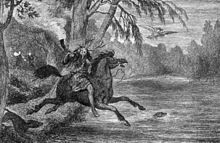Come here the hunter
Herne the Hunter (English Herne The Hunter ) is a character from William Shakespeare's comedy The Merry Wives of Windsor .
Interpretations
Herne is interpreted as the god of the hunt and lord of the game. It is believed that Herne was a local Anglo-Saxon deity in the Windsor Forest , a forest that stretched over the present-day counties of Berkshire , Buckinghamshire and Hampshire . It is assumed that Herne is identical to Cernunnos , a god of the British who is also documented in southern England . In contrast to Cernunnos, however, Herne is primarily regarded as the god of the hunt.
On the contrary, one sees in Herne a manifestation of the Germanic god Odin in the wild hunt . In Beowulf , an old English heroic epic, there is talk of a building called Heorot ( old English heorot = "deer").
Realities
Is known Herne especially from Shakespeare's comedy "The Merry Wives of Windsor":
There is an old tale goes, that Herne the hunter ,
Sometime a keeper here in Windsor forest,
Doth all the winter time at still midnight,
Walk around about an oak, with great ragg'd horns;
And there he blasts the tree, and takes the cattle;
And makes milch-kine yield blood, and shakes a chain
In a most hideous and dreadful manner.
You have heard of such a spirit, and well you know
The superstitious idle-headed eld
Receiv'd, and did deliver to our age,
This tale of Herne the Hunter for a truth.
In an investigation into the origin of Herne s, Rychard (e) Horne was found , a yeoman who was poaching in the Windsor Forest at the time of Henry VIII and was hanged around 1525 for it. Herne itself is also passed down through several sightings in the time of Richard II , Henry VII , Henry VIII or Elisabeth I , i.e. between the end of the 13th century and the end of the 15th century.
A connection between Herne and Horne is based on the earlier recordings of Shakespeare, which were made for the comedy "The Merry Wives of Windsor". Although the comedy was written in 1597, the version seen in the theater today is usually assigned to an edition dating back to 1623. There is an earlier edition of the comedy from 1602 that does not speak of "Herne" but of "Horne". As a result, many see the Yeoman Rychard (e) Horne in Herne . It is possible that "Horne" represents a mistake by the copyists . It is more likely, however, that the edition from 1602 was an adaptation for supraregional use. All local clues were changed, including the spirit of Herne , unknown outside of Windsor Forest.
Literary implementations
Herne can also be found in Robin of Sherwood (German title: Robin Hood), a British adventure and fantasy television series for which Richard Carpenter wrote the script. A connection between Herne and Robin Hood is purely fictional, as Herne in the Sherwood Forest , the whereabouts of Robin Hood, is not recorded.
literature
- Eric Fitch: In Search of Herne the Hunter. Capall Bann Publishing, 1994, ISBN 978-1-898307-23-5 .
- Michael John Petry: Herne the Hunter: A Berkshire Legend . William Smith (Bookseller) Ltd., 1972, ISBN 978-0-9500218-8-1 .
Web links
- Royal Berkshire History: Beware the Ghostly Hunt of Herne the Hunter at berkshirehistory.com
- Mystical Worldwide Web: The legend of Herne the hunter on mystical-www.co.uk (English)
- Haunted Britain & Ireland: Herne the Hunter on afallon.com
